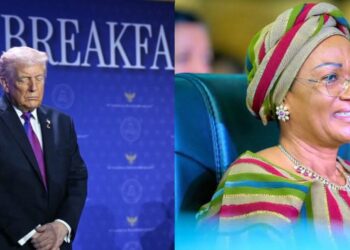
By Ibrahim Kegbegbe
As a journalist who witnessed the historic coronation of Senator Rashidi Adewolu Ladoja as the 44th Olubadan of Ibadanland on Friday, September 26, 2025, I could not help but observe how politics subtly crept into what ought to have been a purely cultural and traditional ceremony. Having reported political news and written opinion articles for years, I have learned that public events often reveal more than meets the eye, and what played out at Mopo Hall that day deserves deeper reflection.
Alhaji Taye Akande Adebisi, popularly known as Taye Currency, is not just a Fuji musician. He is one of the most celebrated godsons of Alhaji Wasiu Alabi Pasuma, popularly known as Ijoba Fuji. Currency rose to prominence in the mid-1990s under Pasuma’s wings, with Pasuma introducing him to fans in Lagos and Ibadan. Over time, he carved his own space, gaining fame, wealth, and even political connections — one of his sons now sits in the Oyo State Assembly, and he himself holds a political appointment under Governor Seyi Makinde.
READ ALSO:Olubadan Ladoja Urges Tinubu to Create Ibadan State Before 2027
Ordinarily, Taye Currency’s presence at the coronation was expected to be a cultural highlight — a reminder of Fuji’s deep-rooted ties with Yoruba traditions. But rather than delivering the expected traditional eulogies to the new Oba and other dignitaries, Currency instead sang songs like “Were La’fi Wo Were”, a choice that many attendees and Nigerians online deemed “unreasonable and ridiculous” for such a royal gathering attended by President Bola Ahmed Tinubu, ministers, traditional rulers, and political heavyweights.
The backlash has been swift and unforgiving. Many argued that Taye Currency failed to respect the sanctity of the throne and the Yoruba tradition of oriki (praise poetry) at such a momentous event. Yet, on closer observation, his performance bore the fingerprints of politics. Taye Currency, who is often the voice at Makinde’s campaigns, appeared to have been subtly deployed as a political weapon against Chief Adebayo Adelabu, the Minister of Power and an APC chieftain eyeing the Oyo governorship in 2027.
READ ALSO:Ambassador Ajadi Hails Historic Olubadan Coronation
The governor’s own speech further revealed the undertone. Instead of properly acknowledging APC stalwarts who accompanied the president, Governor Makinde dismissed them collectively with a phrase mixing English and Yoruba: “Mo ki gbogbo eyin ti’ewa lati Federal. All the Federal Might, ti won wa nibi, mo ki’yin.” This was no slip of the tongue — it was a calculated political message, one that resonated with Makinde’s ongoing rivalry with the ruling party at the center.
Unfortunately, the person who bore the brunt of this miscalculation was not Makinde, but Taye Currency. By turning what should have been a cultural performance into a political stage, Currency now faces condemnation across the Southwest, his reputation dragged as “unfortunate, barbaric, and ridiculous.”
It is ironic because Taye Currency’s rise — musically through Pasuma and politically through Makinde — should have made him a symbol of cultural pride and artistic maturity. Instead, he has been reduced to a pawn in the larger chessboard of 2027 politics. While Pasuma has always uplifted him as an elder godson in Fuji, it seems Makinde’s political calculations risk destroying the very reputation that Currency built over decades.
In my judgment, Taye Currency’s misstep was not entirely his own. It was the consequence of political interference in a cultural space that should have been sacred and above partisanship. The Olubadan stool represents Ibadan’s heritage, not a campaign rally.
If there is a lesson here, it is that artistes, no matter how politically aligned, must learn to separate cultural obligations from political duties. Otherwise, they risk losing the respect of the people whose traditions they are meant to uphold.
READ ALSO:Adelabu’s 2027 Ambition Steals Show at Ibadan Airport
The coronation of an Olubadan comes once in a generation. It should have been remembered for its royal dignity. Instead, it has become a cautionary tale of how politics can taint even the most sacred cultural celebrations — with Taye Currency as the unfortunate scapegoat.
By Ibrahim Kegbegbe
Journalist and Public Affairs Analyst | Lagos, Nigeria

















